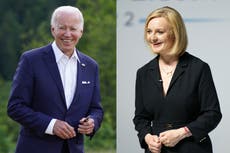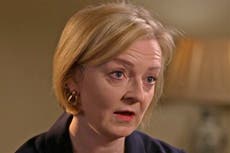Liz Truss warned businesses will ‘go on strike’ by halting investment without clear plan
Companies ‘won’t invest until they see some clarity’, says business chief Martin Sorrell


Companies will halt investment and effectively “go on strike” until they receive more clarity from Liz Truss’s government on its economic plan, one of the country’s top business figures has warned.
Martin Sorrell, founder of advertising giant WWP, claimed Ms Truss and chancellor Kwasi Kwarteng had fuelled uncertainty with the “the lack of specific plan” for public finances.
“We have a whacking great communications gap at the moment, a black hole in terms in communications. Businesses will just go on strike – they won’t invest until they see some clarity,” he told BBC Radio 4’s World at One.
Criticising the chancellor’s handling of the mini-Budget, he added: “The environment – partly as a result of [Mr Kwarteng’s] statement on Friday and what he said over the weekend that there might be other unfunded tax reductions … has created even greater uncertainty.”
Senior Tory MP Mel Stride and others have called Mr Kwarteng to bring forward the fiscal plan and the Office for Budgetary Responsibility (OBR) forecast he has promised for 23 November.
Mr Sorrell said: “We’re not going to get clarity for the next few weeks. No parliament at the moment, Conservative conference coming, no indication that we’ll get a [fiscal] plan and an OBR evaluation until the end of November. So heighted uncertainty until then.”
Despite Ms Truss and Mr Kwarteng’s insistence that tax cuts would encourage investment, Mr Sorrell said businesses do not based key decisions on tax rates. “It’s certainty or uncertainty that makes them invest.”
Mr Stride told TalkTV that the chancellor must announce his fiscal plan to tackle debt “as soon as possible” to reassure spooked markets.
Banking chiefs also told Mr Kwarteng that 23 November was too long to wait the fiscal plan at a meeting on Wednesday senior, according to the Financial Times. But the chancellor is said to be “sticking to his timetable”.
Former Tory chancellor Ken Clarke told Times Radio that Mr Kwarteng should come forward and set out his plan with further clarity.
Lord Clarke said that no other Tory government in his lifetime “would ever have made an economic mistake of this kind” – saying it was built on “the hubris of the leadership election” and “rather wild things” during the campaign.
Meanwhile, a group of 18 union leaders have co-signed an open letter demanding a “cast-iron assurance” from Ms Truss and Mr Kwarteng that they will not embark on a round of real-terms cuts to public services.
“According to reports, another wave of crippling austerity could be on its way in November in order to fund tax cuts for the super-rich,” the letter signed by TUC leader Frances O’Grady and others stated. “This would be an act of national vandalism and a huge betrayal of the British people.”
Earlier on Thursday Treasury minister Chris Philp confirmed that government departments have been asked to stick to existing spending limits – despite rising inflation – and be asked to make efficiency savings.
However, Mr Philp argued on BBC Radio 4’s Today programme that “iron discipline” on public spending would not necessarily lead to austerity.
“If we can get economic growth going, which is our intention, it will lead to wages going up and lead to new and better jobs being created and will ultimately pay the taxes that fund public services like health, the NHS and so on,” he said.
Ms Truss has also confirmed that she is looking for funding cuts across the public services – declaring that there are “plenty of areas” where taxpayers’ money could be saved.
During her local radio media round on Thursday morning, Ms Truss insisted she had “the right plan” to deliver economic growth, but admitted her mini-Budget package gives “disproportionate” gains to the richest in society.
Despite the push for growth, Mr Sorrell predicted a “bathtub recession” – one in which sides are slippery and you don’t come out for a long time – over the next two years. “What we’re going to see 2023 and 2024 are difficult.”
He added: “What I think the government has done here is gamble politically that by the general election in the UK in 2024 there will be some growth and that will bail them out. That is a heck of a gamble, particularly if you don’t have a fiscal plan.”
Join our commenting forum
Join thought-provoking conversations, follow other Independent readers and see their replies
Comments



Bookmark popover
Removed from bookmarks